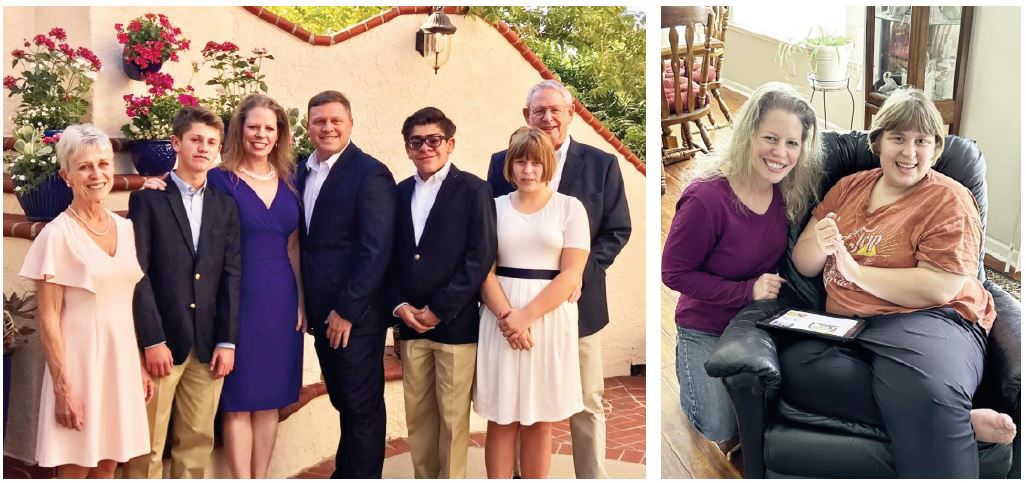
FAMILY TIES: (Above left) Alexa's father's family pose for a family picture -- (left to right) Alexa's Grandma, Erol, Kara, Mark, Evren, Alexa, and Alexa's Grandpa; (Above right) Alexa takes a break from the iPad to take a picture with her Aunt Kara.
patience to help her cope with sensory overload and the overwhelm that accompanies her struggles to process the everchanging world around her. My firstborn son, Evren, Alexa's cousin, is now 21. He lives with acid sphingomyelinase deficiency, or ASMD, a rare genetic disease, which, like autism, is a spectrum disorder. ASMD is multi-systemic and progressive, meaning that it impacts multiple organ systems, such as the liver, heart, bones, and blood, and becomes worse over time.
Evren is a gentle sort, and most everyone who gets to know him admires his kind and positive nature. While he is cognitively unaffected by his disease, raising Evren has involved vigilance and countless interventions because of the nature of ASMD. We spent quite a bit of time at the children’s hospital as he was growing up. Still today, I actively help him navigate his complex care. On the other hand, Alexa has a remarkably healthy body: she has a strong heart and lungs, excellent eyesight and hearing, and even a set of powerful vocal cords like her dad’s. She has a sturdy, muscular build, swims like a fish, and has no qualms about drinking water straight from a hose. If no one intervenes to stop her, she will pluck fresh lemons off a tree in the backyard and eat them with gusto.
Mark and I are both familiar with chronic sorrow. It is a recurring grief, commonly experienced by parents of children with serious and life-long diagnoses, as well as
disenfranchised grief, a form of grief over a loss that many are unable to comprehend, as our children are still with us. We have both traveled the soul-shaking journey through diagnosis and the associated grieving process that comes with the ending of the dream we had envisioned for our children's lives. Each of us raised a child with exceptional parenting needs, and observing each other's trials as parents has given us
insight and perspective about parenting. Despite the hard parts, both Mark and I have no trouble finding reasons to admire and enjoy our children. The pity narrative that sometimes accompanies special needs parenting holds little relevance to us.
"Alexa has helped me learn why language is so important, and to have compassion for those who don't have it."
I admit, though, that the challenges Mark has faced as Alexa's dad, have sometimes boggled my mind. Likely, he would say the same about my experience raising a child with a disease as serious as ASMD. Often the response from onlookers is indeed pity, and in some cases an intentional distancing. Regardless of these reactions, I make it a point to illumi
nate the remarkable and powerful ways children like Evren and Alexa enable us to bring our character to fuller fruition, and how they enrich our lives beyond measure. I cannot speak for my brother in terms of what he has learned from Evren's life, but I can definitely speak to my experience being Aunt Kara to my niece Alexa. What she has taught us that has enriched our lives and carved out new dimensions in our worldviews, is her gift to our family.
Like some, but certainly not all, who have autism, Alexa's language and her ability to express thoughts are limited to formulas, for the most part. An example of her formulaic speech with a predictable intonation pattern is something like this:
Aunt Kara: "Alexa, what is this?"
Alexa (pauses, then pipes up): It's a balloon!
Aunt Kara: "What color is it?"
Alexa: "It's purple!"
But in addition to formulas, Alexa speaks her own little language, sometimes repeating her favorite words and phrases over and over, in what is called echolalia, a calming form of self-stimulation, or "stimming." Sometimes, she will enthusiastically repeat a phrase like, "Do you want?" with a big jolly grin, to prompt us to ask her that same question so that she might fill in the formula with whatever she wants, often a food or drink item, sometimes an activity. Over the years, Mark, Evren, and I have delighted in her verbal pearls of creativity